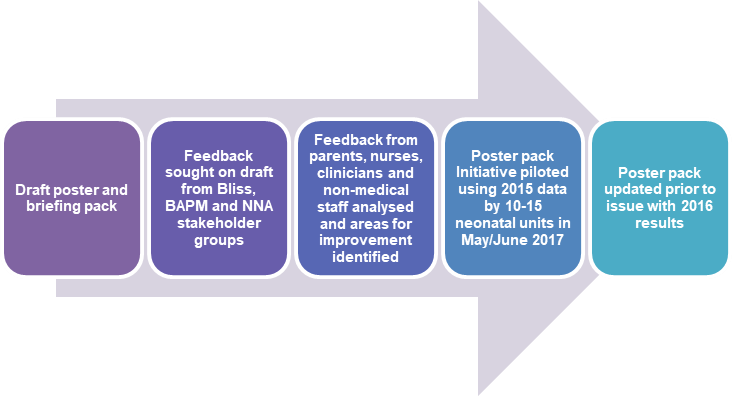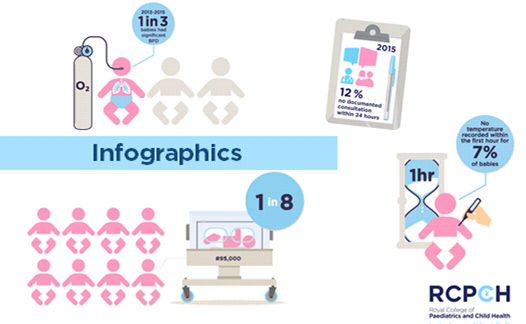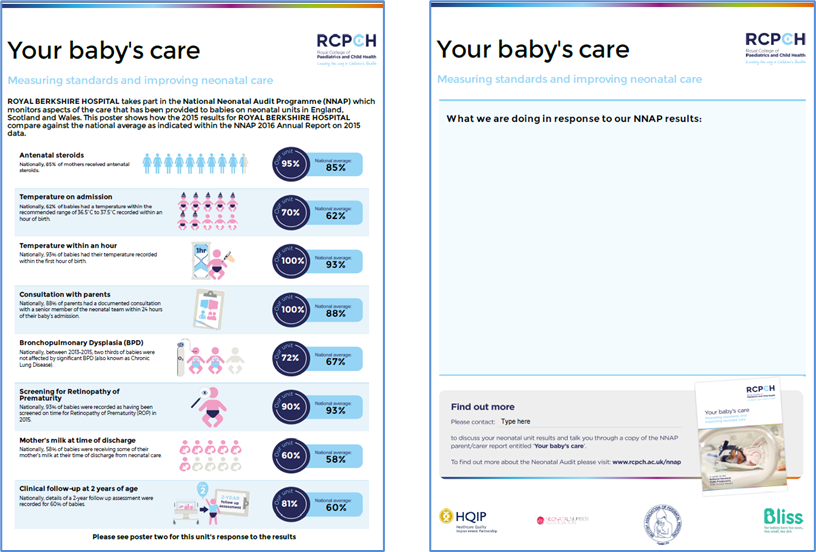Communicating the Aims and Outputs of the National Neonatal Audit Programme to Parents and Families
Developing a briefing document to inform healthcare professionals and parents about their unit using data from the National Neonatal Audit Programme and broaden the focus of a national audit from clinical improvement to encompass the patient experience.
Background
The clear aim of the National Neonatal Audit Programme (NNAP) is to help facilitate and drive up national standards of neonatal care. In 2015, a noticeable gap was identified in regards to the communication between neonatal unit staff and parents about the aims and functions of the NNAP which was impeding the involvement of parents in driving up standards. Parent representatives, nurses and network managers were recruited to form a working group to help find a solution to plug this gap and encourage an increase in engagement.
The identified solution included the adoption of infographics and results into unit-specific posters as a means of easily highlighting NNAP results and a revision of the style and content of the NNAP Parent and Carers report, “Your baby’s care”.
Purpose of the Initiative:
- Better informed parents feel more involved in their baby’s care
- Recognise it’s not for all parents
- Provide the opportunity to demonstrate the good work units are doing in quality improvement
- Broaden the focus of NNAP from clinical improvement to encompass the patient experience
- Better informed nurses who feel more empowered to discuss NNAP with parents and gain more insight into the parent experience
- Utilise the poster to display local data against National Targets and list interventions to improve local results
- Opportunity to share good practice within the Neonatal Community via the RCPCH website and act as drivers for quality improvement with the involvement of clinicians, nurses and parents
What we did
Development of briefing document:

The working group developed a briefing document that set out the purpose of the initiative from a clinician, nurse and parent perspective. Key stakeholders Bliss and British Association of Perinatal Medicine (BAPM) provided valuable support for the project. The briefing document included examples of the poster that shows individual audit results and a second poster that allows the unit to indicate how they have responded to their NNAP results and describe their successes and service improvements. The parent and carer report ‘Your babies care’ is also highlighted as a supportive document that helps to further explain the audit measures in a user friendly way:

Development of the posters
The infographics used within the national report were also used to create poster one. The graphics were used to clearly communicate the local results in comparison to the national average. Poster two was created in order for units to respond to their results as displayed in poster one. Both posters are accessible to download and print from the NNAP Online platform:

Consultation phase
The poster and briefing document were shared for consultation with nursing and parental stakeholder groups in order to capture feedback and identify areas of improvement. Members of the working group shared the initiative with delegates that attended the national NNAP/NDAU Collaborators Meeting in April 2017.
Pilot phase
Feedback received from the consultation and Collaborators Meeting were used to refine the posters and briefing document. 20 units from different levels of neonatal unit volunteered to pilot the initiative for one month and received A3 size colour posters, electronic copies of the briefing document and an evaluation form to be submitted to the project team to help inform an effective national roll-out of the poster initiative to all participant neonatal units.
Photos from pilot units displaying their posters and parent report at Frimley park Hospital and Royal Berkshire:

Pilot feedback from unit staff regarding their views on the value of the poster initiative:
“Yes. It is a good means of communicating with them and families were pleased for this to be shared with them”.
“Yes, publishing unit specific data is very useful as parents are aware of variations across the country and are very interested in how their local unit is performing”.
“Yes. I believe the poster is more eye catching and instant than the leaflets. Also reinforces the leaflets for parents who wish to take an interest”.
“Very much so – it’s been a tremendous help. I have struggled to develop unit posters of
any quality so far and realise it would be a huge challenge to do so every year.
We will probably update our posters 6 monthly if possible”.
What we achieved
By undertaking extensive consultation with key stakeholders the unit level poster initiative will be rolled out with 2016 results alongside copies of the NNAP Parent and Carer report, ‘Your baby’s care’, to all audit participant neonatal units in NNAP Online alongside the launch of the annual report.
We would like to thank all those involved with the development and piloting of the poster quality improvement initiative and we hope that it will be successful in facilitating the sharing of best practice ideas amongst neonatal units. Based on the positive feedback received from units that took part in the pilot we would like to offer units the opportunity to share with us how they have implemented the display of their unit-specific NNAP posters and how they have used them to demonstrate and respond to their NNAP results.
Units are encouraged to submit pictures of their display area, with a focus on how they set out poster two, by sending them to the NNAP project team at: nnap@rcpch.ac.uk and indicate whether they are happy for us to share them with other units and at NNAP events such as the Annual Collaborators’ Meeting:

Authors: Dr Sam Oddie (NNAP Clinical Lead), Ellen Hallsworth and Patrick Tully (NNAP Project Board Parent Representatives), Wendy Hodgson (Neonatal Educator and Service Development Lead), Gina Outram (Neonatal Unit Lead Sister), Zoe Chivers (Head of Services).
Organisations: University Hospitals of Morecambe Bay NHS Foundation Trust, Royal Berkshire NHS Foundation Trust, NNAP, and Bliss.
Published: Originally published as part of the 2017 NNAP report.
